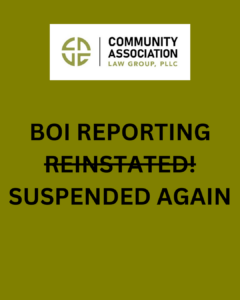This past summer the Washington Legislature enacted new “association records” requirements for communities subject to RCW 64.32 (“Old Act Condos”), RCW 64.34 (“New Act Condos”), and RCW 64.38 (“HOAs”). The legislature essentially took the records language from RCW 64.90 (“WUCIOA”) and added it to the earlier statutes. For the cite checkers like myself, the applicable statutes are RCW 64.32.170, RCW 64.34.372, RCW 64.38.045, and of course, the one that started it all, RCW 64.90.495. However, the legislature did not just copy-and-paste the language in; I could write a dissertation on the potential implications behind these seemingly insignificant differences, but I’ll save that for later articles, and focus instead on a less-obvious change that impacts many Associations and their financial packets.
If your community lists owner delinquencies in their financial packets before distributing them to owners, the new statute suggestions that you may need to redact identifying information. Each statute now has redaction requirements stating associations “must” redact or remove “Individual [apartment, unit, lot] files other than those of the requesting. . . owner” before disclosure. RCW 64.32.170(3)(h), RCW 64.34.372(5)(h), RCW 64.38.045(6)(h), and RCW 64.90.495(3)(h). I frequently look at financial packets distributed to Boards (and sometimes owners) and often see lists of delinquencies with the Unit/Lot number, owner names, and amounts owed. Sometimes these lists even include notes on the duration of the debt, that an owner is on a payment plan, a lawsuit has been started, etc. While this is incredibly valuable information for the Board in creating a budget or strategizing collection efforts, I think we all must now be mindful of what information the membership receives.
I’m not sure the statutory changes intended this outcome, and I wouldn’t even go so far as to say that disclosing an owner’s delinquency information violates statute. However, much of my job is reading ambiguous statutes and applying them to real-life situations, then advising Boards on how they can reduce their association’s potential liability. Here, I could make a very compelling argument that owner account information is part of an owner file, and that cannot be disclosed to the rest of the owners, and I am therefore recommending that this information be redacted from things like the annual financial statements, or even from any monthly financial statements that are disclosed during record requests or otherwise.
To be clear, the Board can and should still be aware of the specific homeowner information for delinquencies, and certain information regarding delinquencies may even need to be disclosed if a records request is made, but the new provision (like many of the provisions in WUCIOA) are still new and untested, so we in the industry have no real way of knowing how a court will interpret the language in the future, but the change does suggest that communities need to be a little more cautious about information disseminated to owners. Associations must disclose their delinquencies, but this can be done without including specific owner information like names and addresses. While this may be an overly conservative interpretation, redacting this information will take such minimal time and effort that I believe it is warranted. If a court ultimately decides that that’s not what the statute requires, then there is still no harm done by redacting the information and in the meantime, redaction might just save your Association from being sued.






